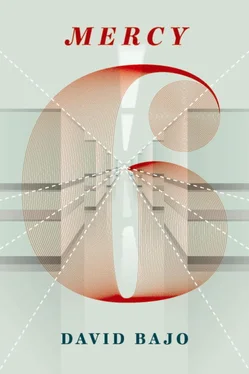Mendenhall remained in the arboretum. She wanted to go to fifth floor containment, the Infectious Diseases wing, to interview the captive visitor and to examine Peterson and her chart. She had every right to do these things, and Thorpe would not prevent her. But doing so might bring too much attention, prompt Thorpe to send people down to Claiborne. The tech may have already stirred interest. The interviews and follow-ups were fine; the reenactments and measuring might have crossed lines.
She pictured again how Silva had cast herself over the patient on Four, how elegant and still she had appeared, how she had drawn the patient toward touching. Thorpe could conceivably have Silva contained—herself as well.
A polite, professional consultation with Thorpe might prompt similar actions. Thorpe would be gathering the same data, the same confounding results. His conclusion would run counter to hers—containment. Infection had been the first call—her call—and thus would be the standing assumption. She felt driven to this room.
The young couple remained on their bench but were stealing looks at her.
“What’s happening, Doctor?” the man asked. He had the same expansive eyes and mouth as the woman, their largeness unnerving on him, fetching on her. Brother and sister.
“It’s just a precaution. I think you’ll be able to leave the hospital soon.”
“We don’t want to leave. We want our dad to be let in. We’re visiting our mother.”
“Soon,” said Mendenhall. “I’m sure he’ll get to see her.”
“She’s dying.”
Mendenhall bowed her head and tightened her mouth. Protocol discouraged any reaction: the mother was not her patient, not her matter. Legally, condolence was affirmation; reassurance was disagreement.
“Can you get him in for us?”
“Who’s her doctor?”
“He left,” said the sister, one corner of her lips crimping. “He got out.”
It was easy to imagine the hexagon contracting, the waterfall gaining volume.
“I’m—we’re all trying to get the hospital open again.”
In the hall, she hesitated: once toward the elevators, then the waiting area, then the arboretum. She had known it would be a mistake to go into the hall without destination, but she had to get away from the already grieving brother and sister. She couldn’t have the nurses see her like this. She strode to the elevators and inserted her express key. The elevator took a long time arriving, confusing her. And in this bracket of unexpected wait, she felt exposed and weakened.
When the steel doors opened, there was Mullich. He stood alone, arms crossed, wearing a lab coat. At first she thought he was wearing a stethoscope, posing as a doctor. But it was something else, a scope of some sort, some kind of viewing lens.
“Doctor,” he said. He stepped out of the elevator and offered its emptiness to her. Cool air rose from the motion of his arm.
“You were outside.” She stayed with him, letting the doors close.
She looked up. “You were on the roof.”
“I’m going to Verdasco’s mark.” He headed toward the waiting area and she followed.
“You got on the roof.” She hustled to stay astride. “You took my elevator from me and got on the roof. I want your key.”
“It will be helpful to have you along,” he said, slipstream still fresh.
Mullich genuflected over the floor mark and aimed his scope toward the long end of the hall, beyond the arboretum and the nurse’s station. Mendenhall stood beside him. Visitors in the ICU waiting area watched as Mullich repositioned himself to take four measurements with the scope, Mendenhall turning with him, pretending.
“He never moved, then?” Mullich peered through the scope. On the near wall it cast three red dots, the middle one more pronounced, the two side ones faint.
“He was already in collapsed position. He went from life to death without moving.”
“No. He traveled to the ER. To you. From here down to there.”
“Look,” said Mendenhall, “I kind of see what you’re doing. Tracking a pattern. A pattern of…” She felt the attention of the waiting-area visitors and caught herself. “A pattern of demise.”
Mullich took one more reading and stood. The visitors left with worried expressions, back to their loved ones or to the cafeteria.
“That’s a good way of putting it.” Mullich faced her. “Good enough.”
Mendenhall shook her head and jabbed a finger toward the scope dangling from his neck. “It’s not. You can’t track death that easily in this place. I pronounced Verdasco dead down in ER. Time of death down there, too.” She raised a fist to show him the cheap running watch on her wrist. “Using this. So what pattern are you tracking? Blood or paper?”
“Blood.”
“Then forget ER. Verdasco died here.” She pointed to the floor mark she and Silva had calibrated. “Dozier died on his ladder.
Fleming died on her roommate’s bed. See, Thorpe’s going to use the paper one. But I don’t care about some nurse’s hopeful fingers taking a pulse that isn’t there, about shoving eyelids closed, about some tired ER doctor pronouncing time of death because some other doctor ran away.”
Mullich, as Silva had done, recorded information in his pad as Mendenhall spoke, focused on accuracy. She let him finish his entries.
Mullich stared at his pad. “And Peterson?”
“My guess is she died in that ventilation room. Right where they found her. But we couldn’t get to Peterson because she’s not mine. Not without pissing off…” With the heel of her palm, she pushed Mullich’s forehead, forcing his gaze to her. “You. You can get me to Peterson. With that key of yours.”
“That depends, Dr. Mendenhall.”
“On what?”
“On what fight you’re fighting.”
She narrowed her look.
“Blood or paper.”
She gave him an honest answer. There probably was no other kind for him. “I’m still deciding. I’ll decide when I return to Claiborne. So give me Peterson. And that witness Thorpe has up there. That’s your next stop, right? Dozier on Seven, Fleming on Four, Verdasco on Three.”
“Not quite. I visit the roof in between each.”
She retracted.
“For perspective.” He raised his scope.
“I gave you an honest answer.”
“Fair enough,” he said. “I do go up there in between—to maintain and record perspective. But I’m also watching the containment. The shape of the containment. Its growth. I’ll take you. I’ll show you. But you have to agree to my conditions.”
“You sound like Thorpe.”
“No. I’m not like Thorpe. I’ve designed buildings—redesigned them—for people like Thorpe. But not this place. Not this hospital. Not this time around. Not anymore.”
Stepping onto the roof meant everything to her. She could still smell it on Mullich, imagine its air trapped in the creases of his lab coat. Visitors approached the waiting area, then veered away when they neared Mendenhall and Mullich.
“What are your conditions?”
Mullich held up his card key. “Every time this is used, it’s recorded. Yours, too. Thorpe’s as well, and any like it. Anyone can see. That’s how it is. That’s how it must be. Transparent action.” She shrugged.
“No,” he said. “You don’t understand. You have to enter your key, too. Even though it won’t open the doors. It will be recorded.
Anyone, including Thorpe, gets to see where you go, where you tried to go.”
“Thorpe won’t play that way.”
“I don’t care. And I’m not playing.”
The roof door rejected her key. A tiny red light above the slot blinked twice. Mullich inserted his key, the light went green, a beep sounded, and the door opened, bypassing containment.
Читать дальше












